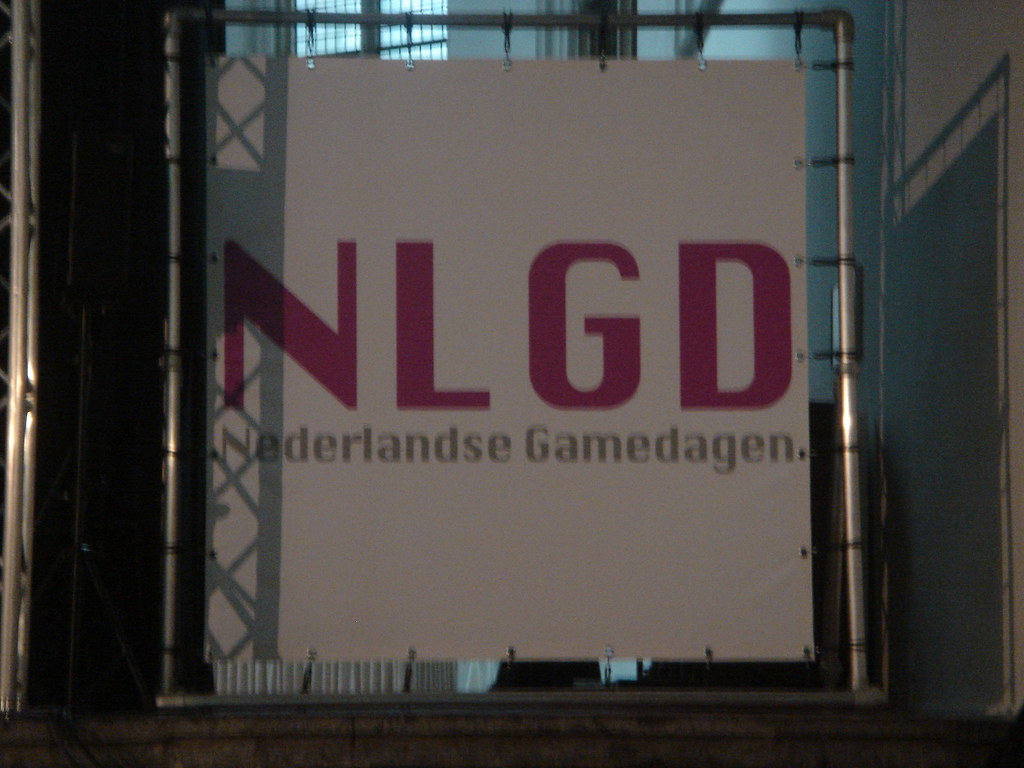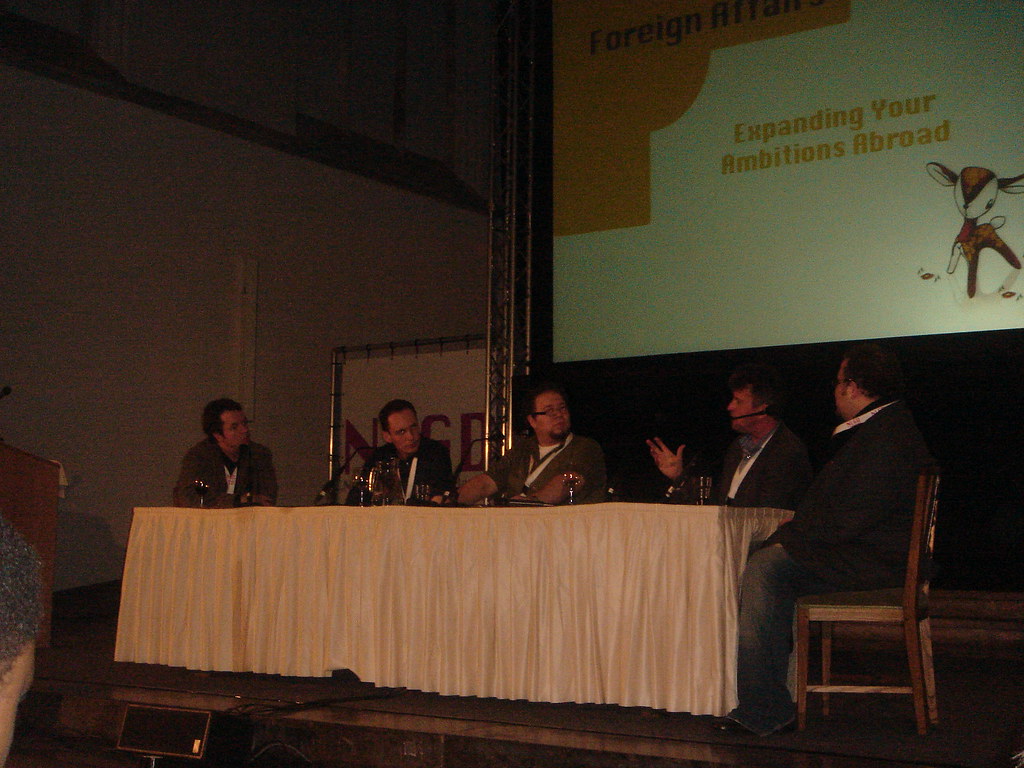 During the past days I was among others in the Dutch city of Utrecht to attend the Nederlandse Gamedagen (Dutch Gaming Days), a two-day conference about gaming. Although most of what was discussed there is not relevant for this blog, I noted a few things that I would like to mention. One of the themes that was discussed during the conference was internationalization, something that really interests me. But the panel discussion was not what I expected from it.
During the past days I was among others in the Dutch city of Utrecht to attend the Nederlandse Gamedagen (Dutch Gaming Days), a two-day conference about gaming. Although most of what was discussed there is not relevant for this blog, I noted a few things that I would like to mention. One of the themes that was discussed during the conference was internationalization, something that really interests me. But the panel discussion was not what I expected from it.
Two Dutch game developers, a professor and two Americans that run a game studio in Holland, discussed the current and future trends of game development internationalization. These guys should be business people, but to me they sounded incredibly naive. Which countries do you think they see as a threat in terms of competition? Canada and France, not countries like China and India. And what should be done about that? The Dutch government should subsidize game developers so they can be more competitive… Come on guys, if you need subsidies you’d better close down your company and choose a different line of business.
 China and India were mentioned, but they felt these countries are no threat. According to them companies there are not as creative, so they are no big danger. True, but things change incredibly fast. So don’t be fooled by believing this will stay like this. Furthermore, and this really made me laugh, they said that a 20-30% lower price in these countries would not be sufficient for game publishers to make their games there. First of all, 20-30% is a lot of money, and most business people would be very interested in finding a partner that can reduce their purchasing prices by this amount. But the fact is that prices in China are probably 50-60% lower than prices in Holland (and sometimes up to 80% lower – I know this from my own experience). There is no way Dutch game developers can survive in a price battle against China. Their argument that salaries in China are catching up fast is also totally wrong: of course salaries grow fast, but it will take decades to bring them at the same level.
China and India were mentioned, but they felt these countries are no threat. According to them companies there are not as creative, so they are no big danger. True, but things change incredibly fast. So don’t be fooled by believing this will stay like this. Furthermore, and this really made me laugh, they said that a 20-30% lower price in these countries would not be sufficient for game publishers to make their games there. First of all, 20-30% is a lot of money, and most business people would be very interested in finding a partner that can reduce their purchasing prices by this amount. But the fact is that prices in China are probably 50-60% lower than prices in Holland (and sometimes up to 80% lower – I know this from my own experience). There is no way Dutch game developers can survive in a price battle against China. Their argument that salaries in China are catching up fast is also totally wrong: of course salaries grow fast, but it will take decades to bring them at the same level.
If I look at Zlong Games (the company that was bought by Spill Group Asia a few months ago) for example, they produce at least the same quality products as the Dutch studios. But until now they were not very competitive in the international market. Because of cultural and language barriers, but also because they did not have the right contacts outside China. We put an experienced foreign sales manager in their company, and I am also helping them in their day-to-day business with foreign clients. The management of Zlong Games is very smart and learning incredibly fast, so they might not need me anymore one or two years from now. And that’s my goal of course, they should learn from us and then do it themselves. Their prices are much lower than what Dutch studios will ever be able to achieve, and they will stay much lower. And this is just one company (although a top one), I know many more that could achieve the same. Watch out Dutch game developers!
Your analysis is very objective and scientific. I am not a person working in gaming industry, but my direct feeling totally agrees with your savvy about China. As a local (I am pleased to see you have become a China hand with very much international experience!and your analysis is always with no bias), we/our friends often get together to discuss the business enviroment in China, one of the topics mentioned sometimes is that “some western business including American are very naive in their business dealing with China.
I am the guy who left the meesege in your post of England in Shanghai, and your trip to Hangzhou and Nanjing…
Donald
So in your industries it’s not so much different than in industries i sometimes work in: limited insight and naivity on their own competitiveness, watching the world changing rapidly from their hammock…i wonder they will wake up in time?
@Donald: thanks for the positive comments. I try to be objective, but that’s not always easy 🙂 Indeed many foreigners see China in a naive way, often because they have not seen it with their own eyes. Or because the media is normallly quite biased in its reporting (reports about China often have a negative tone)
@Erwin: I am afraid they won’t wake up in time. If they would they should focus on what they are good at (creativity for example, or working with their clients) and outsource the rest to a low-cost but good quality country such as China.
Hahah, the guys are either really disconnected or trying to mislead the rest.
In other lines of business this shift of production to lower wage countries has been going on for years. In China the 2nd or 3rd waves are already on the way where production lines are put away further in the country, or outsourced to for example VietNam.
I agree that the creativity is maybe not as big\great\well developed as it is in Europe….but the sheer number of people living in this countries wil produce more then enough to be seriously competitive.
On the other hand.. think about countries like Indonesia, Philipines, Malaysia and THailand which are getting active on all kinds of areas…
If they stay asleep….then it will give you more work 🙂
Best regards from bangkok!
Interesting that western media often blame Chinese media for not being objective and open. My observation is that in general media channels have their own agenda and can hardly stay unbiased. This is okay as long as everyone knows about it and remains cautious and objective about what they read and what they hear. However, if a business people keeps his/her eyes and ears shut and only believes in what he/she wants to believe, it will be fatal!
Marc,
I think your comment about zlong is particularly apt.
Many local companies trying to develop internationally are dismissed straight away (even if their products are fantastic) because:
– they don’t speak english well enough
– the presentation style is not professional enough
– they don’t know how to build professional relationships in the European way (hey, maybe we can make a quick buck writing one of those primers about “doing business in Europe or Australia” similar to the whole load of books there are on doing business in China.
It isn’t quality per se – its presentation.
With more of us foreigners and returning Chinese providing this kind of support and helping internationalise that side of the business the Europeans won’t really know what has hit them.
Nicolas